Text
Research and Writing
I returned my critical articles to the Oakland University Library. It's nice to be done with this project.
1 note
·
View note
Text
Research and Writing
I started the actual writing portion of my project. The abstracts felt a little strange at first to write because I was not used to summarizing, but once I got the feel for it they weren’t too bad. One of the hard parts for the annotations was finding the passages. There were a lot of passages that had good literary significance, but because of Vonnegut’s short and simple writing style they would often be too short to write an annotation on. I wanted to do an annotation on the backwards film that Billy Pilgrim sees of a bombing, but I couldn’t draw enough ideas from it that would make it suitable to write about. After doing the annotations, I found that a lot of the structural aspects, like the cyclical nature in Vonnegut’s writing, come from the extraterrestrial Tralfamadorians.
1 note
·
View note
Text
Research and Writing
I went to the Oakland University library and found some criticism on Slaughterhouse-Five and Kurt Vonnegut. I wasn’t really sure what I was doing, so I checked out five books that looked like they would work. Three out of the five ended up having the type of critical articles that I needed. The first one that I read discussed the idea of renewal in my book, which I thought was an interesting idea that I had not considered previously. At some points while reading the criticism I had to reread some sections multiple times to understand what the author was saying. I noticed that all of my critical articles made a mention of Vonnegut’s structure and how its simplicity, repetitiveness, and disjointed nature assisted in portraying his main ideas. The articles also frequently discussed the characters, but some of them had differing views on the complexity of the main character Billy Pilgrim. One suggested that he was underdeveloped and lacked sophistication and another stated that while he seemed simple, he was actually very complex.
1 note
·
View note
Text
Reading the Work 5
I’ve finished reading Slaughterhouse Five and it came to somewhat of an abrupt ending. The novel ends when Billy Pilgrim is back in Dresden after the bombing instead of ending near the conclusion of his life. This does coincide with Billy Pilgrim’s belief that everyone lives forever and can travel in time to different parts of their lives, but it still felt a little strange ending in the middle of his life. Overall, I really enjoyed reading this book and I liked Kurt Vonnegut’s writing style. At first I was a little surprised by some of the details he decided to include, like how Billy Pilgrim woke up after having a wet dream, but I got used to it. I realized that Slaughterhouse Five is metafiction, as the author talks about writing the book in the first chapter. Although the book is about Billy Pilgrim and not himself, the author does mention his presence in scenes from the novel a couple of times, which reflects Vonnegut’s experience in WWII. I found out that Vonnegut was held a prisoner of war in a slaughterhouse in Dresden, which provided inspiration for the work.
1 note
·
View note
Text
Reading the Work 4
I am almost done with the novel and the bombing of Dresden finally occurred. I found it ironic that Billy Pilgrim and a few other Americans survived the bombing by being in the basement of a slaughterhouse. The slaughterhouse itself was called Slaughterhouse Five, which is where the title of the novel comes from. While the book is fiction, I discovered that the bombing of Dresden was an actual event that occurred in World War II. From what I found on the internet, it was considered a very controversial bombing on the allies’ part and I was surprised that I had never heard of it before. This is probably one of the major things that Vonnegut wanted to expose because lots of people, like me, have never heard of the bombing before. This leads me to ask the question, is the reason I’ve never heard of the bombing of Dresden because I’ve been educated in the American school system that tends to overlook atrocities like this? Or is the bombing of Dresden not covered in most classes around the world studying World War II?
0 notes
Text
Reading the Work 3
I am a good portion of the way through Slaughterhouse Five now and the main character, Billy Pilgrim, continually travels through time to other parts of his life, especially his time during the war and on Tralfamadore. In many instances, because of this time traveling, the outcomes of many of the events in the novel, past or future, are already known before they happen because Billy Pilgrim already knows about them and discusses them. Unlike most other books, the novel has no definitive beginning or end in a reader’s perspective because of this. Pilgrim jumps around in his life so much that a straightforward journey is hard to find. This lack of beginning and end fits right in with Tralfamadore concept of time that is frequently discussed as they believe that people can go back between parts of their lives even after they have died. So far I’m not completely sure on what the thematic significance that Vonnegut is trying to convey with this idea in the novel.
0 notes
Text
Reading the Work 2
As I was reading, I came across a passage of the novel that described seeing a WWII bombing in reverse. The bombers sucked up fire and destruction and put it into small containers, which were then sent back to the U.S., dismantled, and the contents were “shipped to specialists in remote areas… to [be] put into the ground… so they would never hurt anyone again” (94). This passage struck me because after reading it, a part of me wished that this “bombing in reverse” could actually happen. I wanted the death and destruction caused by war to be as easily fixable as simple sucking it up and burying it in the earth. While this is not possible, the simple solution to the problem would be to not drop the bombs at all. Considering that a main focus of the novel is the bombing of Dresden, in which many innocent lives were lost with poor justification, it is fitting that the book would provoke this negative response to bombings and war from me.
0 notes
Text
Reading the Work 1
I have started reading the novel Slaughterhouse Five by Kurt Vonnegut. It starts out with a very intriguing first line stating, “All this happened, more or less. The war parts, anyway, are pretty much true.” This makes me wonder how many of the events that happened to Billy Pilgrim, the main character of the novel, actually happened to him. Since the narrator of the novel is not Billy Pilgrim and is instead a soldier who encountered him, many of the events described are not firsthand experiences, and thus are prone to being embellished or made up, more or less. Some of them, like Pilgrim’s abduction to Tralfamadore, might have been the result of him going insane after World War II and telling these “events” to the author. It’ll be interesting to see how Vonnegut blends Billy Pilgrim’s fantasy-like experiences with those of the war to convey his ideas and themes. So far I enjoy the Vonnegut’s writing style as the paragraphs are not overly long and are straight to the point.
0 notes
Text
Picking the Work 2
I talked to Mr. Kreinbring about what book I should read out of the three. I asked him about The Picture of Dorian Gray and he said that we might still read it in class this year so I couldn't do it. I then asked about Slaughterhouse Five and he thought it was an excellent choice, so I decided that I will do my project on it.
0 notes
Text
Picking the Work 1
When I started thinking about what book to read I searched a list of the top books in English on the internet. I scanned the list and considered doing The Picture of Dorian Gray, One Flew Over the Cuckoo's Nest, or Slaughterhouse Five. I decided on those books because I had heard of them before and read what each one was about.
0 notes
Photo
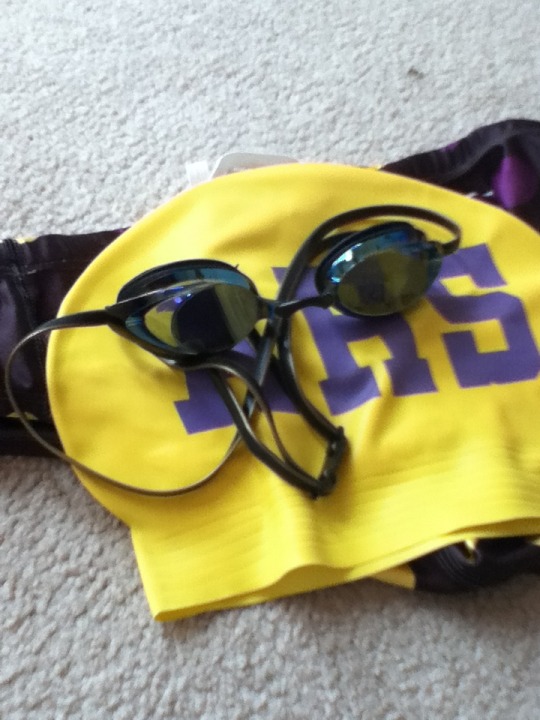

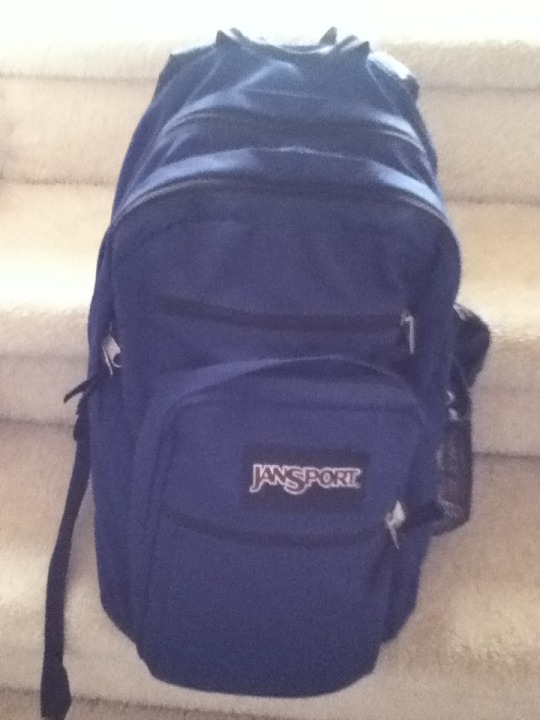


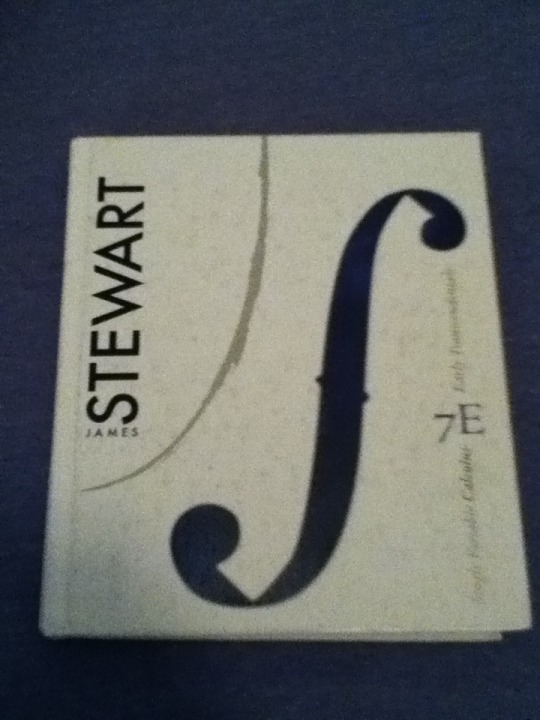
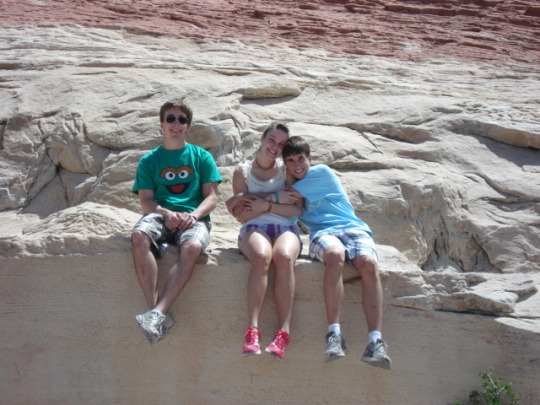
1. Swimming has a huge weight on my life. Not only are there the big expectations to swim fast, but the practices are also very demanding and many times I fear going to them. It takes up large amounts of my time year-round. My goggles, cap, and suit weigh very little physically, but are a burden, about 200 pounds.
2. The college recruitment letters represent the big decisions I have make in my life. Whether it be deciding where to go to college or deciding whether or not to swim collegiality, these decisions weigh a lot because they will affect my life for many years. They weigh about 75 pounds.
3. My backpack holds the things I carry around school: my books, pencil, folders. It's about 20 lbs.
4. I carry food around with me to school, swim meets, and other places. It gives me energy to stay focused and to not get exhausted under the load of the things I carry. The food usually weighs a few ounces, but it helps relieve the burden of many pounds.
5. I carry wallet with me almost everywhere I go. It only weighs a few ounces and it gives me freedom to go places and buy things.
6. My math book weighs a few pounds, and along with this physical weight comes the weight of the expectations and the pressure to do well in school. It can be difficult to keep up with these expectations, causing my math book to weigh about 100 pounds.
7. I carry the weight of living up to the achievements of my brother and sister. Also, during tough times we help carry each other to get through them. The weight cancels out in the end.
1 note
·
View note
Photo
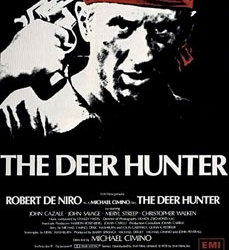
The Deer Hunter, set during the Vietnam War, is an example of an anti-war war movie. It is about a trio of friends who enlist and fight in the Vietnam War. The movie takes on the form of a typical war movie as there is a lot of action and fighting. Yet, throughout the movie, many of the negative aspects of war that are not normally showcased in a war movie occur. When the friends first arrive in Vietnam, many innocent civilians are slain by North Vietnamese soldiers. Later, one of the friends suffers amnesia because of the traumatic events during the war, and this eventually results in him taking his life in a game of Russian-roulette. Also, at the end of the movie, one of the friends can’t bring himself to shoot a deer while hunting, an activity he did many times prior to the war, because he can’t bear to take another life. These negative aspects to the war are rarely seen, if ever, in a war movie that glorifies war. A war hero never suffers from post-traumatic stress that eventually causes that hero to take his life.
1 note
·
View note
Text
Favorite Poem
"I Sit and Think" I sit beside the fire and think of all that I have seen, of meadow-flowers and butterflies in summers that have been; Of yellow leaves and gossamer in autumns that there were, with morning mist and silver sun and wind upon my hair. I sit beside the fire and think of how the world will be when winter comes without a spring that I shall never see. For still there are so many things that I have never seen: in every wood in every spring there is a different green. I sit beside the fire and think of people long ago, and people who will see a world that I shall never know. But all the while I sit and think of times there were before, I listen for returning feet and voices at the door. John Ronald Reuel Tolkien
1 note
·
View note
Link
R.A. Dickey is simply amazing.
0 notes
Text
Discussion with my Parents
When I asked my parents if they had seen Rebel without a Cause, neither of them had. Both my parents agreed that the things the teenagers did in the movie were very exaggerated compared to what teenagers really did, although my mom kept stressing that the movie was “way before her time.” They thought that switch blade fights and things like a chickie run were just plain stupid and that not very many people actually did those things. However, they both thought that the problems the characters had in the movie like going to a new school and having family issues were and still are common problems in teenagers’ lives.
1 note
·
View note
Text
My Moral Belief
My moral belief is to treat other respectfully. The reason for this is because if I treat other people with respect, more often than not they will treat me with respect. This is the easiest way for me to be treated the way I want to be treated. Obviously if a person is consistently disrespectful to me I have to draw the line on how respectfully I treat them or else I probably would be taken advantage of. Also, by treating others with respect I am doing my part in making the world a better place to live in.
0 notes
Text
Ferris Bueller's Day Off
Ferris Bueller’s Day Off gives an accurate portrayal of many of the problems that teens have. Lots of teens don’t like going to school and have rivalries with their siblings just like Ferris Bueller, and many will also fake sick from time to time in order to skip school. This makes the characters themselves more believable because they have teenage problems and they act like normal teenagers because they are just trying to have some fun. However, the movie is so exaggerated that it is unrealistic. It is very unlikely that a kid could skip school, go to Chicago in a sports car, go to a Cubs game, sing in a parade, and do lots of other while tricking his parents into thinking he is sick and in bed all in one day. Obviously the makers of the movie know this, so it is evident that this movie was made mostly for entertainment purposes.
1 note
·
View note